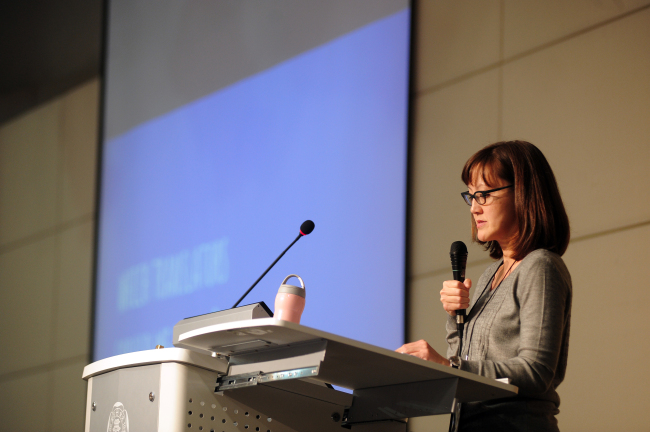Korean literature, along with Korean cinema and art, is typically known to be full of doom and gloom, reflecting the country’s struggles with Japanese occupation, postwar poverty or, more recently, post-IMF depression. Translator Sora Kim-Russell, however, believes that underneath “han” -- which, roughly translated as “angst and sorrow,” is an emotion that has come to exemplify the Korean arts -- there is a subtle but rich undercurrent of humor.
“I think that different readers and translators see different things,” replied Kim-Russell in an interview with The Korea Herald, when asked what characteristics would best describe Korean literature to the international audience.
“For me ... I see a lot of humor in it, like a kind of dark, earthy humor,” she said.
“I think there’s a tendency to view Korean literature as depressing ... and the han is the defining thing. But one of the ways Koreans resolve han is through humor. Tears, yes, but also humor,” she said. “So for me, I would say it’s those two things (that characterize the literature), sorrow and the ability to laugh.”
 |
Translator Sora Kim-Russell speaks at a lecture at Ewha Womans University on Friday. (Literature Translation Institute of Korea) |
Kim-Russell is a biracial Korean-American literary translator, born and raised in the U.S. and now living in Seoul. Though literary translation had not necessarily been her original career goal, she says it was ultimately a natural convergence of her interests, which include literature and writing.
She has since achieved significant success in the field, winning prizes for her translations from the Literature Translation Institute of Korea and other organizations. Her works include “Our Happy Time” by Gong Ji-young, “I’ll Be Right There” by Shin Kyung-sook and “Nowhere to be Found” by Bae Suah. Her manuscript for Pyun Hye-young’s novel “Ashes and Red” is currently seeking a publisher.
In her most recently published translation project, “Princess Bari” by Korean novelist Hwang Sok-yong, Kim-Russell says she discovered a lot of unexpected humor that was “kind of funny and slapstick,” which she appreciated.
“I think (the humor) tends to get a little lost in translation. So I do like to bring that out as much as I can when I come across it,” she said.
Kim-Russell also called attention to the diverse voices of colonial era authors such as Kim Yoo-jeong and Hyun Jin-gun, whose works constitute the canon of Korean literature.
“One writer that I really like is Kim Yoo-jeong,” she said, mentioning the author’s short story “Spring Spring.” “What I like about (the story) is that it’s funny. There’s a lot of humor to it. And you can look at it and talk about the exploitation of labor and ... these very tragic themes, but at the same time there’s the comedy that goes with it.”
More and more people in the international audience are being introduced to Korean literature now, Kim-Russell said, through publishers such as the Dalkey Archive Press, which carries a series of modern classics of Korean literature. Works such as “The Vegetarian” by contemporary novelist Han Kang have also been garnering positive reviews from the international media.
“It’s not just one note, there’s a lot of complexity to the way that these writers (talk) about what is going on,” Kim-Russell said, emphasizing the importance of letting their distinct styles shine through in translation.
By Rumy Doo (
bigbird@heraldcorp.com)








